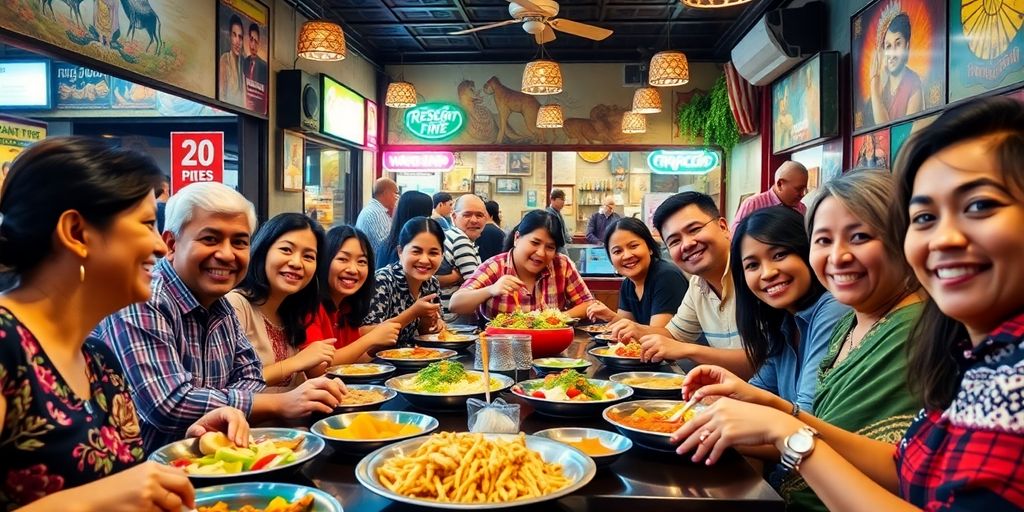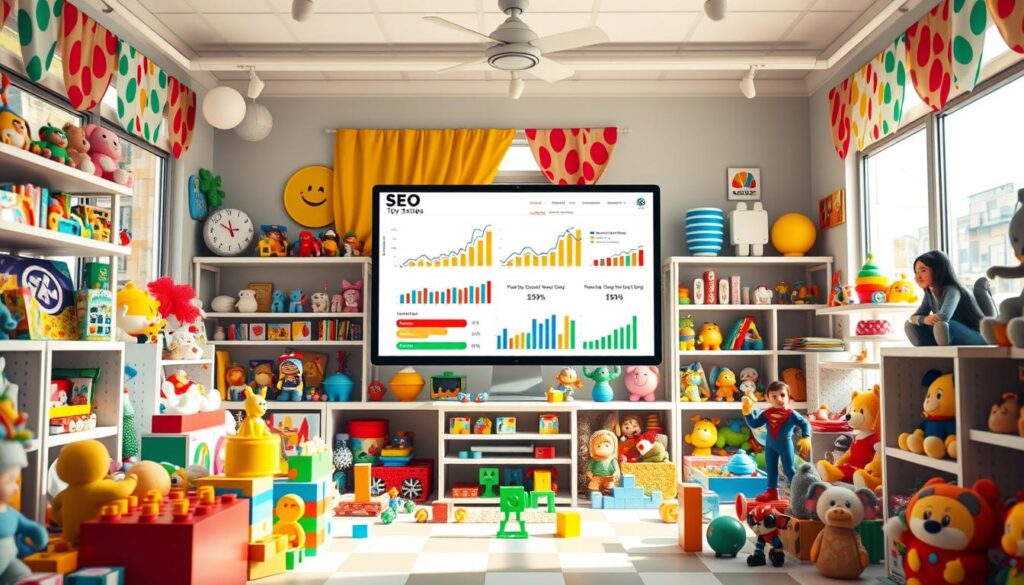SEO can be a game changer for ethnic restaurants. It’s not just about having great food; it’s about making sure people can find you online. Whether you’re serving up spicy curries or savory dumplings, getting your restaurant noticed on the web is key. This guide breaks down how ethnic restaurants can use SEO to reach more customers and fill more tables.
Key Takeaways
- Local SEO is vital for ethnic restaurants to attract nearby customers.
- Creating engaging content like blogs and social media posts helps connect with your audience.
- A well-optimized website improves user experience and search engine ranking.
- Customer reviews can significantly impact your restaurant’s online reputation.
- Building strong backlinks enhances your site’s credibility and SEO performance.
Understanding Local SEO For Ethnic Restaurants
Importance Of Local SEO
Local SEO is like the secret sauce that helps ethnic restaurants stand out in their community. When someone in your area is craving a specific cuisine, you want your restaurant to pop up first in their search results. Local SEO is crucial because it makes sure your restaurant is visible when potential customers search for "best [your cuisine] near me" or similar phrases. This means more foot traffic and, ultimately, more sales.
Key Components Of Local SEO
There are several key components to focus on when optimizing for local SEO:
- Google My Business: Claim and optimize your listing. Ensure that your address, phone number, and hours are accurate.
- Local Keywords: Use keywords that include your location and type of cuisine.
- Online Reviews: Encourage satisfied customers to leave positive reviews on platforms like Yelp or Google.
Strategies For Local SEO Success
To succeed with local SEO, start by ensuring your website is mobile-friendly and loads quickly. You should also:
- Optimize Your Website: Include your location in meta tags and descriptions.
- Build Local Links: Collaborate with local bloggers or news sites to get mentioned.
- Engage on Social Media: Share local events and engage with your community online.
Local SEO isn’t just about getting noticed; it’s about connecting with your community and making sure your restaurant is the go-to spot for authentic ethnic cuisine. It’s about turning searchers into diners by showing them why your restaurant is worth a visit.
Creating Engaging Content For Your Audience
High-Quality Visual Content
In the world of ethnic restaurants, visuals are everything. You have to make your food look as good as it tastes. High-quality images can captivate potential customers and make them want to visit your restaurant. Use images that highlight your dishes’ colors and textures. Don’t forget to optimize these images for web use by compressing them and using alt text to help with SEO. Alt text not only aids accessibility but also provides search engines a better understanding of what your images represent.
Blogging About Cultural Significance
Blogging is a fantastic way to share the stories behind your dishes. Write about the cultural significance of your cuisine. Why is a certain dish special? What are its origins? These stories can help your audience connect with your food on a deeper level. Consider writing posts that explore the history of your ingredients or the traditions of your cooking methods. This not only enriches your content but also helps with SEO by naturally incorporating long-tail keywords that your audience might be searching for.
Utilizing Social Media Effectively
Social media platforms like Instagram and Facebook are powerful tools for restaurants. They let you engage directly with your audience and showcase your offerings. Post regularly, share behind-the-scenes content, and encourage user-generated content like customer photos and reviews. This interaction can boost your visibility and create a community around your brand. Remember to use relevant hashtags and geotags to increase your reach. Social media isn’t just about posting; it’s about creating a dialogue with your audience and keeping them engaged.
Optimizing Your Website For Search Engines
Mobile-Friendly Design
In today’s world, people are glued to their phones, so your restaurant’s website better be ready. A mobile-friendly design is not just a perk; it’s a must-have. With most diners searching for places to eat on their phones, your site needs to look good and work well on any screen size. A responsive design will adjust automatically, giving users a smooth experience whether they’re on a phone, tablet, or desktop.
Improving Loading Speed
Nobody likes waiting around, especially when they’re hungry. If your website takes forever to load, potential customers might just move on to the next option. Fast loading times are crucial for keeping visitors on your page and improving your search rankings. Use tools to check your site’s speed and optimize images and code to make everything load faster.
Clear Navigation And Structure
A website that’s easy to navigate is like a well-organized menu—it helps people find what they need without any hassle. Make sure your site has a clear structure with intuitive menus and links. Place important information, like your location and contact details, prominently. You might even want to add a Google Maps link on your contact page to make it easier for customers to find you.
A well-optimized website not only attracts visitors but also keeps them engaged, leading to more foot traffic in your restaurant.
To enhance restaurant revenue, focus on local search optimization by incorporating local keywords into your website. This is crucial as 46% of Google searches are aimed at finding local information.
Leveraging Customer Reviews And Feedback

Encouraging Customer Reviews
Getting more reviews can be a game-changer for your ethnic restaurant. Think about it: when was the last time you tried a new place without checking out what others had to say? Exactly. Start by providing excellent customer service. Happy customers are more likely to leave positive feedback. Sometimes, just asking for a review works wonders. You can do this in person or through a friendly follow-up email. Make it simple for them by providing direct links to your review profiles on platforms like Yelp or Google.
- Offer a small incentive, like a discount on their next visit, to nudge them into leaving a review.
- Ensure your staff is trained to ask for reviews politely.
- Display signs in your restaurant encouraging customers to share their experience online.
Responding To Reviews
Whether the feedback is glowing or a bit harsh, responding to reviews shows you care about your customers’ opinions. Start by thanking the reviewer, whether the feedback is positive or negative. For negative reviews, apologize sincerely and offer to resolve the issue privately. This shows potential diners that you’re committed to improving their experience.
- Respond promptly to reviews, ideally within a few days.
- Keep your responses short and professional.
- Use feedback to identify areas for improvement.
Impact Of Reviews On SEO
Reviews are more than just feedback; they play a significant role in your restaurant’s online visibility. Positive reviews can boost your search engine rankings, making it easier for new customers to find you. They build trust and credibility, crucial for attracting diners. On the flip side, negative reviews can hurt your reputation, but they also provide an opportunity to show how you handle criticism.
"A steady stream of positive reviews can significantly enhance your restaurant’s online presence, leading to increased reservations and a stronger reputation among potential diners."
By focusing on these elements, ethnic restaurants can not only improve their SEO strategy but also create a loyal customer base that keeps coming back for more.
Building A Strong Backlink Profile
Importance Of Backlinks
Backlinks are like votes of confidence from other websites. They tell search engines that your restaurant is a credible source of information. For ethnic restaurants, especially in bustling cities like Chicago, having a strong backlink profile can significantly boost your local SEO. When local food bloggers or cultural sites link to your restaurant, it signals trust and relevance, helping you stand out in search results.
Strategies For Acquiring Backlinks
Building a network of quality backlinks requires a bit of strategy. Here are a few steps you can take:
- Collaborate with local influencers and food bloggers: Reach out to them for reviews or features. A mention from a reputable source can do wonders for your SEO.
- Participate in community events: Sponsoring or participating in local events can get your restaurant mentioned in local news outlets and online platforms.
- Partner with nearby businesses for joint promotions. This not only fosters community ties but also creates opportunities for mutual backlinking.
Remember, quality trumps quantity. A single link from a well-known food critic is more valuable than numerous links from unrelated sites.
Monitoring Your Backlink Health
Keeping an eye on your backlinks is crucial for maintaining a healthy profile. Use tools like a Backlink Checker to analyze your current links. This tool helps you see which sites are linking to you and assess their quality. If you find any broken or irrelevant links, take action to replace or fix them. Staying proactive ensures that your backlink profile remains robust and beneficial for your restaurant’s SEO.
Consistently monitoring and updating your backlink profile is essential. It helps sustain your online reputation and ensures your ethnic restaurant remains at the top of search results.
Utilizing Advanced SEO Techniques

Schema Markup For Restaurants
Ever heard of schema markup? It’s like giving search engines a cheat sheet about your restaurant. By using schema, you can help search engines understand your menu, events, and even customer reviews. This means when someone searches for a place to eat, your restaurant might pop up with all the juicy details right there in the search results. Think of it as giving your restaurant a spotlight in the digital world.
Geo-Targeting Content
Geo-targeting is all about making your content speak the local language. Not literally, but by including local landmarks or events in your content. Say your restaurant is near a popular park or hosts a local music night. Mentioning these in your website’s content can make your place more relatable to locals searching online. It’s like telling search engines, "Hey, we’re part of this community!"
Local Structured Data
Structured data is like giving search engines a map of what your business is all about. It helps them know where you are, what you offer, and when you’re open. By using local structured data, you’re making it easier for search engines to show your restaurant to someone searching for "best ethnic food near me." It’s like having a digital signpost pointing right to your door.
Advanced SEO isn’t just about being found; it’s about being understood by search engines. With techniques like schema markup, geo-targeting, and structured data, you make your restaurant’s online presence as inviting as your dining room.
For restaurants looking to boost their online visibility, Revenue Boomers specializes in SEO services that can help you stand out in search results and attract more diners.
Tracking And Analyzing SEO Performance
Using Analytics Tools
To really understand how your SEO efforts are paying off, you gotta dive into analytics tools. These tools give you a peek into what’s working and what’s not. Google Analytics is a big player here. It helps you see where your traffic’s coming from, what pages people are hanging out on, and how long they’re sticking around. These insights are gold because they show you what’s grabbing attention and what’s falling flat. Other tools, like SEMrush or Ahrefs, can help you track keyword rankings and see how you’re stacking up against the competition.
Conducting Regular SEO Audits
Regular SEO audits are like health check-ups for your website. They help you spot problems before they become big issues. During an audit, you’ll look at things like site speed, mobile-friendliness, and whether your pages are optimized for search engines. You might find broken links or pages that load too slowly. Fixing these can improve your site’s performance and keep users happy. A good audit can also uncover opportunities for new content or keywords you might’ve missed.
Adjusting Strategies Based On Data
Once you’ve got all this data, it’s time to put it to use. Look at what’s working and do more of that. If something’s not working, tweak it or try something new. Maybe a certain keyword isn’t bringing in traffic, or a page isn’t converting like you thought it would. Use your data to make informed decisions. This might mean rewriting content, changing up your keywords, or even redesigning parts of your site. By staying flexible and data-driven, you can keep your SEO strategy effective.
In the fast-paced world of SEO, staying on top of your data isn’t just smart—it’s necessary. Keeping an eye on your performance and being ready to pivot can make all the difference in keeping your restaurant visible and attracting more diners.
Remember, effective SEO is essential for restaurants to enhance online visibility and attract customers.
Conclusion
In the bustling world of ethnic dining, having a strong online presence is just as important as serving up delicious dishes. SEO isn’t just a buzzword; it’s a tool that can help your restaurant shine in a crowded market. By focusing on local SEO strategies, like optimizing your website and engaging with customers on social media, you can make sure that when people are searching for a taste of something different, they find you. Keep your content fresh, your website user-friendly, and your interactions genuine. With a little effort and the right approach, your ethnic restaurant can not only attract more diners but also build a loyal community around your unique flavors. So, dive into the world of SEO and watch your restaurant grow.
Frequently Asked Questions
What is local SEO and why is it important for ethnic restaurants?
Local SEO helps ethnic restaurants appear in search results when people nearby are looking for a place to eat. It’s important because it attracts local customers who are interested in trying new and diverse cuisines.
How can social media help my ethnic restaurant’s SEO?
Social media can boost your restaurant’s SEO by driving traffic to your website. Sharing pictures of your dishes and engaging with customers online can increase visibility and attract more visitors.
What type of content should I create for my ethnic restaurant’s website?
Create content that tells the story of your food and culture. This can include blog posts about the history of your dishes, high-quality photos, and videos showcasing your restaurant’s atmosphere.
Why are customer reviews important for my restaurant’s SEO?
Customer reviews help build trust and credibility. They also improve your restaurant’s ranking in search results, making it easier for new customers to find you.
How can I make sure my restaurant’s website is mobile-friendly?
To ensure your website is mobile-friendly, use a responsive design that adjusts to different screen sizes. This makes it easier for customers to navigate your site on their phones.
What are backlinks and how do they help my restaurant?
Backlinks are links from other websites to yours. They help improve your SEO by showing search engines that your site is trustworthy and relevant.






